|
King Street King
Street was Darlaston's main shopping street. It originally
consisted of a mixture of houses and workshops, where
hand-crafted items were sold. Over the years the workshops
and the houses were converted into the shops that we can see
again thanks to Bill Beddow's excellent photographs,
which were taken on a quiet Sunday morning in October 1965. |
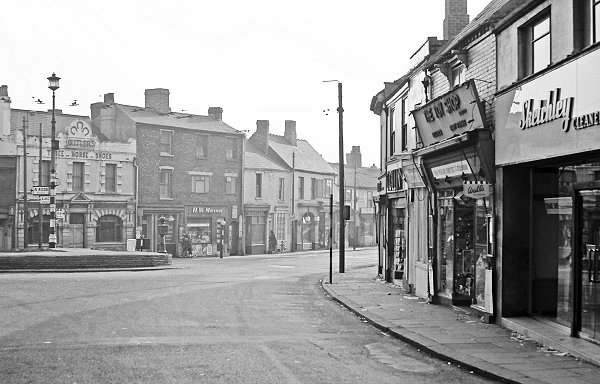 |
Looking towards the Bull Stake and
Pinfold Street from the bottom of King Street. |
| This view captures the atmosphere of the old town. The
shops on the right at the bottom of King Street are
Appleyards the drapers (almost out of sight on the corner);
Collins' shoe shop; the Cabin Café;
The Toy Shop, also known as Middleton's; and Sketchley dry
cleaners. Appleyards, which was established in 1908 had
recently closed. It would soon be replaced by The Toy Shop
which moved into the larger premises. When this happened,
Decorarte, which specialised in curtains, moved into The Toy
Shop's old premises. Middleton's Toy Shop specialised in
children's toys of all kinds, prams, nursery furniture, and vinyl
records. Collins' shoe shop would soon close, and be
replaced by a William Hill betting shop. The Cabin Café was
a popular meeting place. The snack bar sold
grills, breakfasts, hot pies, and sandwiches etc.
Across the way in Pinfold
Street can de seen the Three Horse Shoes, a Butler's pub;
Boynton's which sold cooked meat; H. W. Mason's newsagents;
Robinson's cake shop; The Sweet Shop; Boynton & Sons
butcher's shop; two of Len Mitchell's four shops, selling
jewellery, prams, cycles, radios, and televisions; and E.
Dolman's shop. |
| A view of the western side of King
Street. |
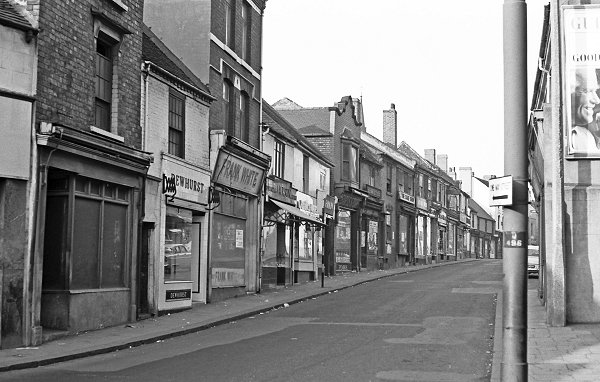 |
| The shop on the extreme left had clearly been empty for
some time. Next door is Dewhurst butcher's shop, which at
the time was one of the 1,400 Dewhurst shops in the UK. Next
door is another butcher, Frank White, whose shop appears to
have closed. It was briefly replaced by a shop selling
ornaments and framed photos. Next on the right is Jackson's
dispensing chemists, soon to be taken over by Phillips. When
the building was demolished in January 1988, the original
timber frame was discovered, possibly dating from the 17th
century. Next door but one is Firkin's the bakers, which a
few years later moved across the road into a new building.
Next on the right is Pearks' grocers shop, and Bayley's pork
butchers, which had been empty for several years. The Bayley
family also owned the house next door, which by 1965 was
derelict. It was the last private house in King Street. Next
door is The Cake Shop which is also derelict. Within a few
years Pearks, Bayleys, and the Cake Shop were demolished to
make way for a Liptons supermarket.
The next two shops are empty. The one on the right had
been George Mason's grocery shop. Next door is a run-down
Timothy White's chemist shop. In 1968 it would become Boots
the Chemist. Next door but one is a florist, and Newman's
grocery shop, on the corner of High Street. |
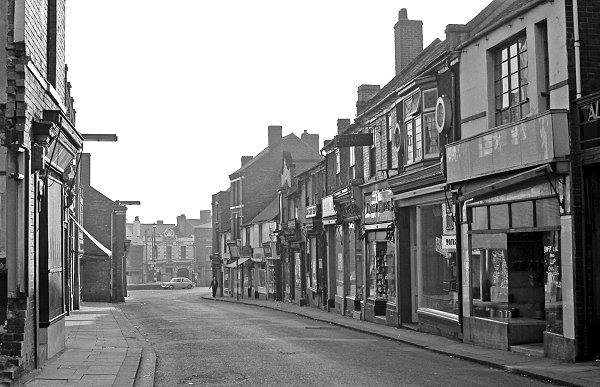 |
Another view of the shops from the
opposite direction.
Looking towards the Bull Stake. |
| Another view of the western side
of King Street, from High Street to Church Street. |
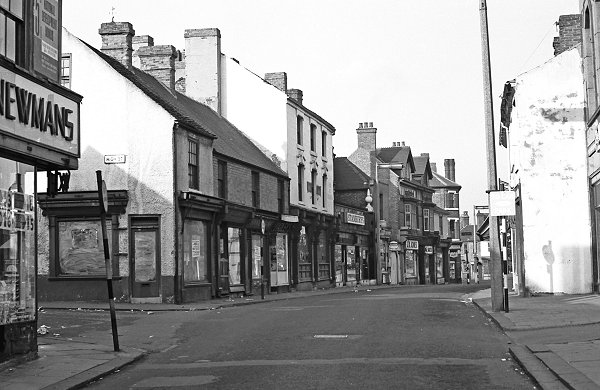 |
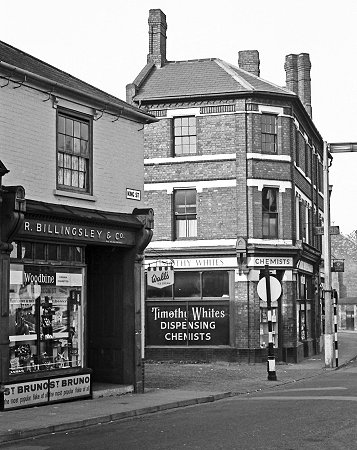
The top of King Street, with
Billingsley's tobacconists, and the White
Lion car park (known as The Fold) on the left. |
Many of the shops in the photograph above were
demolished in the early 1970s to make way for High Street
Precinct which led to the first ASDA store in the town.
The first four shops after High Street are empty. They
were John Adey's butchers shop, Frank Lewis's corn and
animal food shop, Boynton & Son's butchers shop and J & K
butchers shop.
On the right is the derelict Dog and Partridge pub, which
is next door to the well known Stanburys'
drapers, milliners, and gents outfitters shop. The single
story shop, which closed in the late 1960s was an extension built in front of
Poplar House, one of the fine town
houses that were a feature of King Street before it became the main
shopping area.
Next door is Eric Bayley's newsagents, which was soon
taken over by A. F. Parsons, and next right is Joseph Jones'
wallpaper shop, William Bakers' bakery and pastry cook shop,
and R. Billingsley & Company, tobacconists. |
| Timothy Whites, which can be seen in the photograph
above, was one of the country's leading dispensing chemist and houseware
dealers, with a large chain of shops.
In 1935 it merged with Taylors Drug Company Limited, and formed
Timothy Whites & Taylors with over 600 shops. In 1968 it was
taken over by Boots, and the shop became a branch of Boots
the Chemist. |
| A final view of the western side
of King Street looking back towards High Street. |
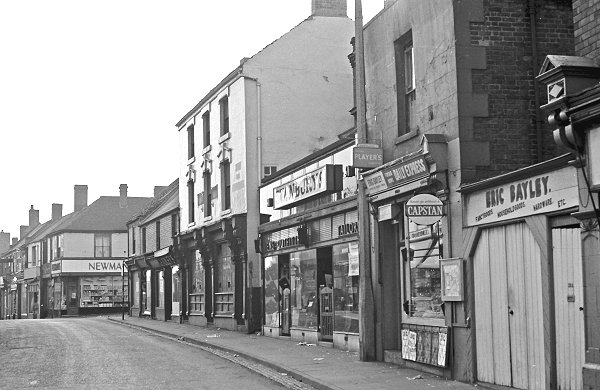 |
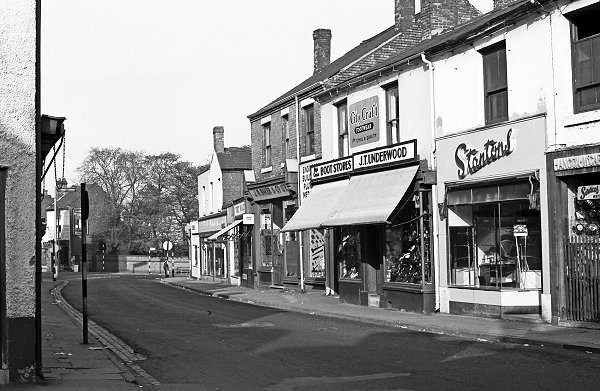 |
The eastern side of King Street
looking towards Victoria Road. |
| In the photograph above, the shop on the extreme right
is Hancox & McCarthy's the jewellers, and next door is
Stanton's the bakers.
To the left is a very well known local shoe shop, James
Thomas Underwood's Boot Stores, which is next door to
another equally well known shop, J. W. Baker & Company
Limited, ironmongers.
To the left is Percy W. Salt's butchers shop, a carpet
shop, M. & F. Bliss's ladies clothes shop, and on the corner, Paynes' shoe repairs. |
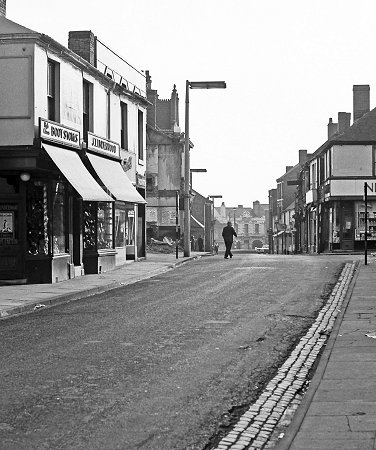
Looking back towards the Bull Stake. |
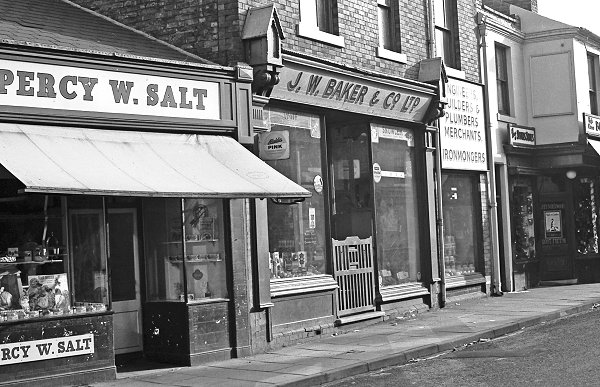 |
A close-up view of Baker's
excellent ironmongers shop, also a joiners, builder's merchants,
and plumbers. |
| The top of King Street looking
towards Victoria Road. |
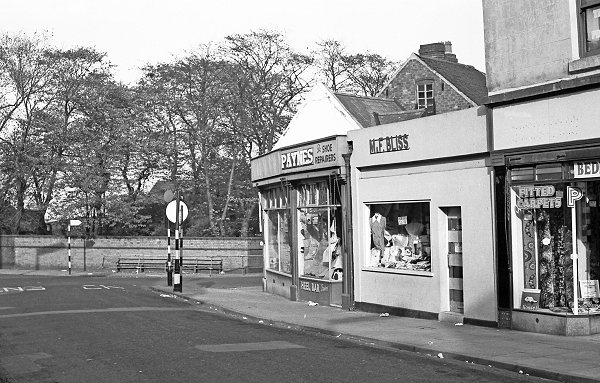 |
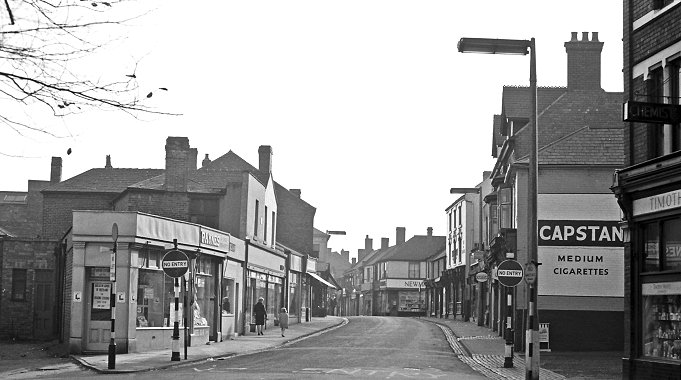
A final view of King Street from it's junction
with Church Street.
 |
Return to
the
previous page |
|